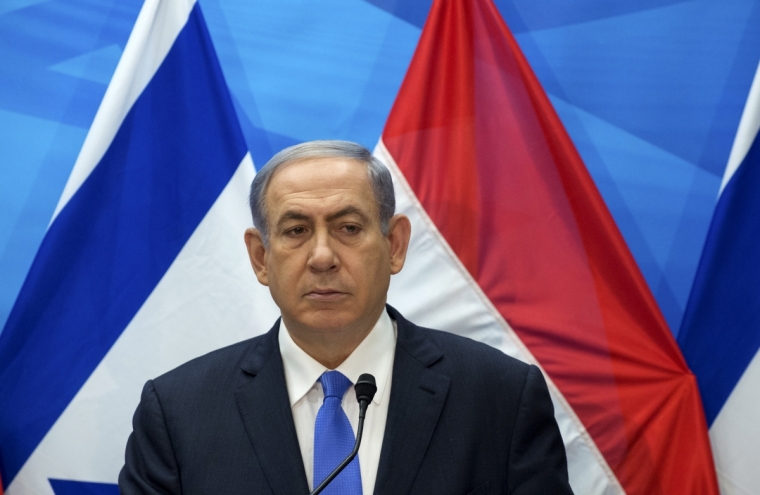Obama praises, Netanyahu laments nuclear deal with Iran

WASHINGTON (Christian Examiner) – Nuclear negotiators from the United States, Britain, Germany, China and Russia have reached an agreement with Iran to curtail its ambitions for a nuclear weapon, President Barack Obama announced from the White House today.
Obama said the United States and its negotiating partners had "achieved something that decades of animosity has not – a comprehensive, long-term deal with Iran that will prevent it from obtaining a nuclear weapon."
According to the president, the effort to negotiate the deal was in line with the tradition of American leadership in foreign policy and diplomacy. He invoked the legacy of President John F. Kennedy, who negotiated an uneasy peace with the Soviet Union when the world was facing "catastrophic nuclear war."
"In our time the risk is that nuclear weapons will spread to more and more countries, particularly in the Middle East – the most volatile region in the world," Obama said. "Every pathway to a nuclear weapon has been cut off."
But Israeli Prime Minister Benjamin Netanyahu isn't buying what the president is selling. In a somber statement from Jerusalem, Netanyahu said the agreement was "an historic mistake for the world."
"Far-reaching concessions have been made in all areas that were supposed to prevent Iran from obtaining nuclear weapons capability," Netanyahu said.
"In addition, Iran will receive hundreds of billions of dollars with which it can fuel its terror machine and its expansion and aggression throughout the Middle East and across the globe."
Iranian President Hassan Rouhani claimed on Twitter, however, that Iran's neighbors should "not be deceived by the propaganda of the warmongering Zionist regime. Iran and its power will translate into your power."
Iran, Rouhani said, was not seeking weapons of mass destruction – all evidence to the contrary. In a televised statement after the announcement from Vienna, Rouhani said the 12-year dispute emanating "from illusions of the western governments and the propaganda to spread such illusions in the international community" was over.
According to President Obama, under the deal Iran will not be allowed to produce highly enriched uranium and plutonium, both necessary for the production of nuclear weapons. He also said that Iran will surrender 98 percent of its enriched uranium, currently enough to produce 10 nuclear weapons.
That fact was previously undisclosed and illustrates that Iran was much closer to a nuclear weapon than most realized, but as Netanyahu had repeatedly warned.
Far-reaching concessions have been made in all areas that were supposed to prevent Iran from obtaining nuclear weapons capability. In addition, Iran will receive hundreds of billions of dollars with which it can fuel its terror machine and its expansion and aggression throughout the Middle East and across the globe.
The prohibition on enriched uranium lasts only a decade and, under the terms of the deal, Iran may not stockpile nuclear material for a period of 15 years.
Iran will also be required to remove two-thirds of its nuclear centrifuges and ship spent fuel from nuclear reactors out of the country. Under the agreement, the United States and other world powers also agreed to assist Iran in modernizing its one current nuclear reactor, but no new heavy water reactor can be constructed for 15 years.
Obama also said Iran will not be able to trade standard military arms for a period of five years and ballistic missile technology for a period of eight years.
All elements of the agreement, Obama said, are subject to inspect. U.S. and international inspectors for the International Atomic Energy Agency (IAEA) will have 24-hour access to Iran's mines, centrifuge facilities, and manufacturing and storage facilities.
"This deal is not built on trust," Obama said. "It is built on verification."
According to Obama, sanctions relief will be phased in as Iran makes progress toward fulfilling its international commitments. If it does not, Obama said the sanctions already imposed on the country will be reinstated.
The deal drafted by diplomats from the P5+1 will be reviewed by Congress in the coming days, Obama said. However, the president warned subtly that Congress should avoid tampering with what is already on paper.
"We give nothing up by testing whether or not this problem can be solved peacefully," Obama said.
Obama sought to soothe the rupture the deal has caused between the U.S. and its only democratic ally in the region, Israel. He said the U.S. would continue its "unprecedented efforts to strengthen Israel's security – efforts that go beyond what any American administration has done before."
Netanyahu said the negotiators of the agreement wanted to make a deal at any cost. In this case, he said the cost may be the survival of his nation. He called on all Israeli politicians to put aside "petty differences" to unite in the defense of Israel.
RELATED ARTICLE:
Israel rejects nuclear deal with Iran as non-binding on the Jewish state